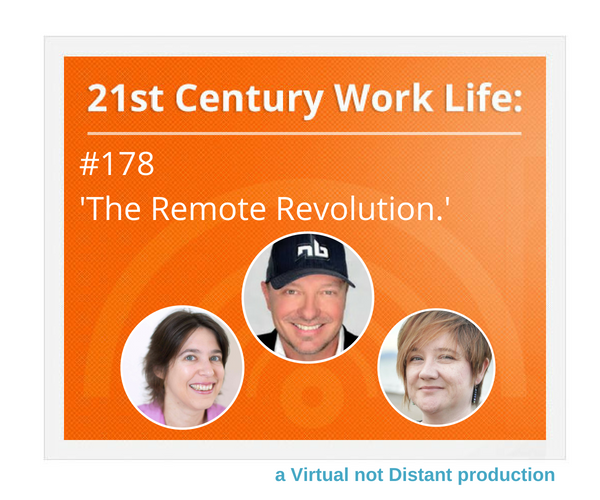WLP178 - The Remote Revolution
This week the tide is turning. We're talking ‘bout a revolution – bring on remote work! It’s making the world a better place.
Don’t forget to tell us what you think, at https://www.virtualnotdistant.com/hello - and we really enjoyed your feedback on the previous episode, continuing the great ‘home-workers dress code’ debate… Are you Team Pyjamas, or vehemently opposed to such a travesty? Have your say – Tweet us with your views, (but please do fill in the survey too!)
As online meetings are such a vital part of working from anywhere, we talk about that too, reflecting a great discussion at Virtual Team Talk – where we cover everything from tools to tech to body language. What do you think?
12:57 The Voice Behind The Book: John Elston
John Elston is the author of The Remote Revolution (and has joined us before to talk about gig teams). The subtitle of the book is “How the Location-Independent Workforce Changes the Way We Hire, Connect, and Succeed”, which John felt better resonated with the values and content of his writing, and speaking directly to the decision-makers in work location policy – to help them identify the qualities of a great remote colleague.
John has truly walked-the-talk as a location-independent team member, drawing inspiration from the rich variety of places he has lived and worked for decades.
He shares his journey through the practicalities, the concerns and the pace of change… And how 21st century workers can leverage this to create a work-life style unique to them, whether that means telecommuting from a home office or travelling the world. Being truly nomadic is not for everybody – but knowing who you are and what you need for personal fulfillment, has a deep impact on what you bring to your work.
And he reminds us clearly that none of this should scare the HR department either – because when you liberate your teams to take responsibility for their own choice of workplace, you are rewarded by loyalty, synergy, and productiveness. Drawing on his own experience of this epiphany as a CEO illustrates the transition very powerfully, the kind of transitions that we work through with our consultancy clients at Virtual Not Distant.
Connect with John via his website and on Twitter.
(John also references Basecamp’s Jason Fried’s classic work in this space, “Remote”).
38:44 Recommended tool: Zoom
How would we manage at Virtual Not Distant, without Zoom? Well, we’d use another video meeting tool, there are many out there, but we love Zoom for some of its unique features:
Firstly breakout rooms, really help mirror the face to face experience when delivering workshops – it’s great to be able to put people together in groups and switch up the energy.
The ‘hide yourself’ feature is also cool – we don’t usually sit in meetings with colleagues in front of a large mirror! So the ability to hide your own camera feed whilst talking to others, is a nice touch.
Overall, it’s just a nice easy user experience, where everything simply works, smoothly and intuitively. A typical freemium model, but, you get all the features right out of the box for shorter meetings – you only pay when you want to use it for longer.
No, we aren’t sponsored by Zoom either! We just know what we like.
43.23 Oh, No! My Team’s Gone Remote! And once everyone starts to work from anywhere, it's going to be a disaster…
Does the idea of ‘working from anywhere’ conjure up all sorts of concerns, from concentration to communication? Will we get too dispersed and fragmented, and as a manager will that mean a lack of control?
Perhaps there’s an underlying sense that, to be a true “remote revolutionary”, you should be able to do any kind of work, from any location, at any time… but choice can be daunting: Where should I do my work today? That’s already used up some of my concentration and decision-making bandwidth.
But the reality is that transitioning to an office-optional work policy is all about finding the best fit, for each individual, in terms of how people can best do their work. We talked about this back in episode 169 .
Asking whether your task needs concentration, contemplation, communication or collaboration might help (along with this blog post).
We’ll see you again in two weeks, and meanwhile we’d love to hear what you think of our content - please do complete our user survey here!
If you like the podcast, you'll love our newsletter:




